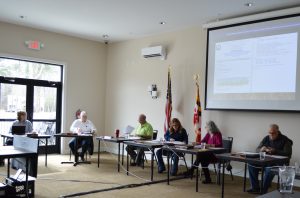
OCEAN PINES – Association officials say they will consider a board policy on social media usage.
Director Doug Parks presented the Ocean Pines Association (OPA) Board of Directors last week with a proposed social media policy. He argued protocols for the use of social media platforms would ensure information shared by directors would be consistent.
“I’m generalizing here, but sometimes there may be a source of confusion as to where the official pieces of information regarding Ocean Pines reside …,” he said. “I think it’s very important we make sure the community knows while we’re not dismissing any of the other sources, that we do make sure everybody is aware there is an official information source.”
Association President Colette Horn said she was against a proposed social media policy, as the board had already agreed to what information should be shared online.
“I guess we did make a consensus agreement that our personal postings on non-OPA websites would be factual information sharing, sharing what’s available on the OPA website or other governmental websites that have the authority over whatever topic we are posting, and that it be referenced,” she said. “Is there an appetite for creating a policy for that?”
Director Larry Perrone said he didn’t agree with establishing a social media policy.
“I think the board has agreed that official statements will come out through the president,” he said. “We also agreed any posting we put on any social media site would be factual. I’m just loath to start making procedures because a couple people, 1%, are confused.”
During last week’s public comments, Ocean Pines resident Dinah Hoffmeister came before the board to share her concerns regarding private Facebook messages sent to her by Director Amy Peck. The messages involved comments about 2021 board candidate Stuart Lakernick and his wife Esther Diller.
Parks argued the incident could have been avoided by having a policy.
“Just think about that public comment that was made,” he said. “Perhaps we could’ve avoided that if we had more guidance, is all I’m saying. As much as you want to provide information, it could be misinterpreted.”
Director Frank Daly said he respected both views, but believed board members did not need a policy when interacting online. He noted the association’s attorney had already provided guidance on social media usage.
“Number one, he said speak for yourself only and make sure you are speaking for yourself only. Number two, avoid rumor, speculation, innuendo or coat tailing. Number three, if you’re asked a specific question, you owe this person nothing, but give only factual information available in the public domain,” he said. “If you follow those guidelines, we’re in good shape. If you don’t follow those guidelines, we’re not in good shape.
He continued, “It’s common sense, and I don’t think we need to write common sense down as a policy.”
Horn agreed.
“You’ve been an individual who consistently has said let’s not create bureaucratic burden for ourselves, and this policy might be bureaucratic burden for us for enforcement,” she told Parks. “What we have done in the past is we have discussed in our director orientation meeting general expectations for how we conduct business as directors and how we conduct ourselves as directors, and I think this is a practice that could be discussed at that point.”
Parks, however, said a policy would simply document those expectations.
“Frank, I would agree with your comment regarding common sense, but I dare to say – and people can hate me for it – not everybody that walks up here has common sense …,” he added. “If you hate the word policy, let’s call it guidance. But the idea is having something we can reflect on and be consistent. We are talking about something that can go from board to board to board.”
Peck said she supported the creation of a code of conduct, and Director Rick Farr said he had submitted a draft policy for the board’s review.
“I think it is something we should definitely take a look at,” he said.
Daly said if the board were to create a policy, it should take the advice of legal counsel.
“If we are going to codify it, we should take the advice the attorney gave us and that would be the guidelines for us in some form of resolution,” he said.
But Perrone argued the creation of a board policy would be no different than Resolution B-08, a policy regarding officer ethics and conduct that was rescinded by the board last year.
“We’ve been down this road with the code of ethics,” he said. “B-08, while its intentions were good, was a disaster. By making this a policy, we have no enforcement mechanism if someone decides to go against that policy. I think it’s just creating problems that don’t exist at this point.”
With no further discussion, Horn recommended consulting with the association attorney. She asked Peck to lead the effort.
“What I’m proposing is we do further study on this, … and maybe come back with a more concrete proposal,” she said.

